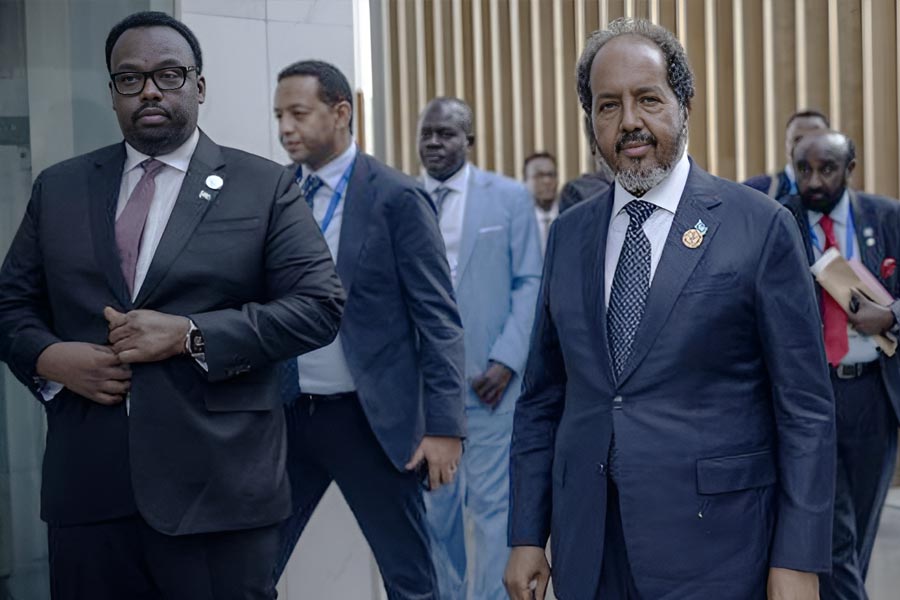
Commentaries | Feb 17,2024
Oct 14 , 2023
By Hintsa Andebrhan
The political schemes of the Horn of Africa have long held the attention of global powers. Historically, Ethiopia has been at the epicentre of this regional interest, particularly from the United States. From 1953 to 1974, a robust U.S.-Ethiopia military alliance flourished until an army coup upended it. With the dawn of the new millennium, the alliance was rejuvenated, with Ethiopia positioned by Washington DC as a linchpin in the broader global strategy against terrorism.
Billions of dollars in military and humanitarian aid were channelled to Addis Abeba. The late Prime Minister, Meles Zenawi, was frequently in the limelight, representing Ethiopia’s interests in major international summits. However, despite these diplomatic accomplishments, certain economic opportunities with the West were left unexplored.
Meles’s tenure, although marked by political influence in the region, particularly in isolating Eritrea, lacked a comprehensive economic strategy. His Administration seemingly failed to craft policies that could have drawn significant foreign direct investments (FDI), mainly from Western economies, particularly the US, to boost the economy. His successor, Halimariam Desalegne, faced his challenges, primarily internal party politics that led to the dissolution of the Ethiopian People’s Revolutionary Democratic Front (EPRDF).
During these transitions, Washington began recalibrating its strategy in the region.
Late September witnessed US Secretary of Defense Lloyd J. Austin III visiting countries in East Africa, save Ethiopia, inking a five-year military pact with Kenya. This shift seems to signal a withdrawal from Ethiopia, a country whose troops have combatted the Al-Shabab, a fundamentalist armed group in Somalia for over two decades. The rapidity of this change raises questions about America’s longstanding relationship with Ethiopia and its recalibrated geopolitical strategies.
Under Prime Minister Abiy Ahmed (PhD), Ethiopia’s diplomatic posture towards its neighbours has been increasingly perceived as inconsistent. Notably, relations with Sudan have become increasingly strained, centred around territorial disputes and contrasting foreign policy approaches. The recent standoff with General Abdel Fattah al-Burhan, Sudan’s de facto leader, is a case in point.
Four years ago, various media outlets, including this newspaper, highlighted the complexities of the evolving Sudanese political landscape. However, despite these warnings, Prime Minister Abiy’s Administration appeared unprepared to foster warm ties with the Burhan-led Sovereign Council in Sudan. This tension culminated in Sudan’s audacious move to claim territories along the Ethiopian border. Such moves from Khartoum were perhaps emboldened by perceived policy missteps and public statements from Addis Abeba, leading to Ethiopia’s exclusion from Burhan’s recent diplomatic itinerary.
Home to the African Union (AU) and a founding member of the Organization of African Unity (OAU), Ethiopia’s responsibility transcends its national boundaries. With a duty to uphold the sovereignty of African states, the current Administration is obligated to nurture constructive relationships regionally and globally.
Yet, the past few years have hinted at a concerning trend. Ethiopia’s diplomacy seems to waver between assertiveness and reticence, occasionally lacking the strategic vision needed to navigate the geopolitical complexities of the African continent.
Diplomacy, often seen as the softer instrument of statecraft, requires a nuanced and strategic approach. For a country like Ethiopia, steeped in a rich history and regional significance, diplomatic endeavours must be guided by cunning, loyalty, and enlightenment.
With its intricate political landscape, the Horn of Africa demands astute diplomatic strategies. The stakes are high for Ethiopia. America’s realignment towards Kenya should serve as a reminder of the fluid nature of global geopolitics. In this evolving paradigm, Prime Minister Abiy and his Administration should refine Ethiopia’s diplomatic playbook, ensuring that the country remains a formidable and respected player on the global stage.
Instead, his Administration would recognise the pitfalls of using diplomatic postings as political tools, rewarding politicians who were falling out of his favour. The need of the hour is to cultivate a cadre of dedicated career diplomats who, driven by national pride and strategic insight, can adeptly navigate the complex matrix of international relations.
PUBLISHED ON
Oct 14,2023 [ VOL
24 , NO
1224]


Commentaries | Feb 17,2024

My Opinion | Oct 12,2024

Fortune News | Feb 17,2024

Commentaries | Dec 28,2019

Commentaries | May 25,2024

Radar | Oct 07,2023

Viewpoints | Nov 16,2019

Viewpoints | Aug 31,2019

Radar | Oct 03,2020

Covid-19 | Apr 04,2020

Photo Gallery | 173871 Views | May 06,2019

Photo Gallery | 164097 Views | Apr 26,2019

Photo Gallery | 154175 Views | Oct 06,2021

My Opinion | 136587 Views | Aug 14,2021
Editorial | Oct 11,2025

Dec 22 , 2024 . By TIZITA SHEWAFERAW
Charged with transforming colossal state-owned enterprises into modern and competitiv...

Aug 18 , 2024 . By AKSAH ITALO
Although predictable Yonas Zerihun's job in the ride-hailing service is not immune to...

Jul 28 , 2024 . By TIZITA SHEWAFERAW
Unhabitual, perhaps too many, Samuel Gebreyohannes, 38, used to occasionally enjoy a couple of beers at breakfast. However, he recently swit...

Jul 13 , 2024 . By AKSAH ITALO
Investors who rely on tractors, trucks, and field vehicles for commuting, transporting commodities, and f...

Oct 11 , 2025
Ladislas Farago, a roving Associated Press (AP) correspondent, arrived in Ethiopia in...

Oct 4 , 2025
Eyob Tekalegn (PhD) had been in the Governor's chair for only weeks when, on Septembe...

Sep 27 , 2025
Four years into an experiment with “shock therapy” in education, the national moo...

Sep 20 , 2025
Getachew Reda's return to the national stage was always going to stir attention. Once...

Oct 12 , 2025
Tomato prices in Addis Abeba have surged to unprecedented levels, with retail stands charging between 85 Br and 140 Br a kilo, nearly triple...

Oct 12 , 2025 . By BEZAWIT HULUAGER
A sweeping change in the vehicle licensing system has tilted the scales in favour of electric vehicle (EV...

Oct 12 , 2025 . By NAHOM AYELE
A simmering dispute between the legal profession and the federal government is nearing a breaking point,...

Oct 12 , 2025 . By NAHOM AYELE
A violent storm that ripped through the flower belt of Bishoftu (Debreziet), 45Km east of the capital, in...